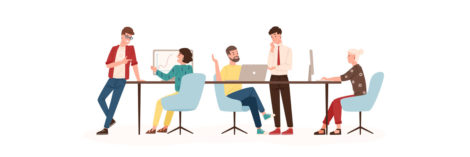What are the new habits caused by confinement? How does consumer behaviour change when consumers are stuck at home? Which companies will be the big winners from the Coronavirus crisis? This is what we invite you to discover thanks to the evolution of the research carried out on google. We have selected 22 keyword searches carried out over the last 90 days in France and Belgium. They are the perfect mirror of our questions as humans and consumers and predict our future changes in behaviour. This analysis also shows that Google Trends is an attractive complementary tool for market research in general and market trend research in particular.
Overview
The coronavirus crisis is forcing consumers to change their habits. Their Internet searches are revealing their current concerns and herald the changes in behaviour that are underway. If confinement lasts long enough, some new practices could become habits. Online shopping may increase, as may online games and streaming sites. These changes could, therefore, lead to significant changes in sectors such as the media (subscription to streaming sites and online newspapers on the rise), in retail (switching from in-store to online shopping).
Summary
- Introduction
- Doing your shopping
- Eating
- Having fun, keeping busy
- Working
- Playing sport
- Everyday problems and other worries
Introduction
The coronavirus crisis is forcing us all to review the way we operate, whether in private or professional life. We are looking for alternatives to what we did before or solutions to problems caused by confinement. If confinement is extended, these new ways of working could become habitual, and the return to “old” ways of working may become complicated. I have found an interesting post that explains how we adapt our behaviour to crises. From phase 3 onwards, new habits are established (“new normality”) which will become more and more deeply rooted as the crisis continues. New leaders and new businesses will inevitably emerge from this crisis. New purchasing behaviours could also take root if the confinement continues, unbalancing, for example, supermarket purchasing habits (see our analysis of retail trends).
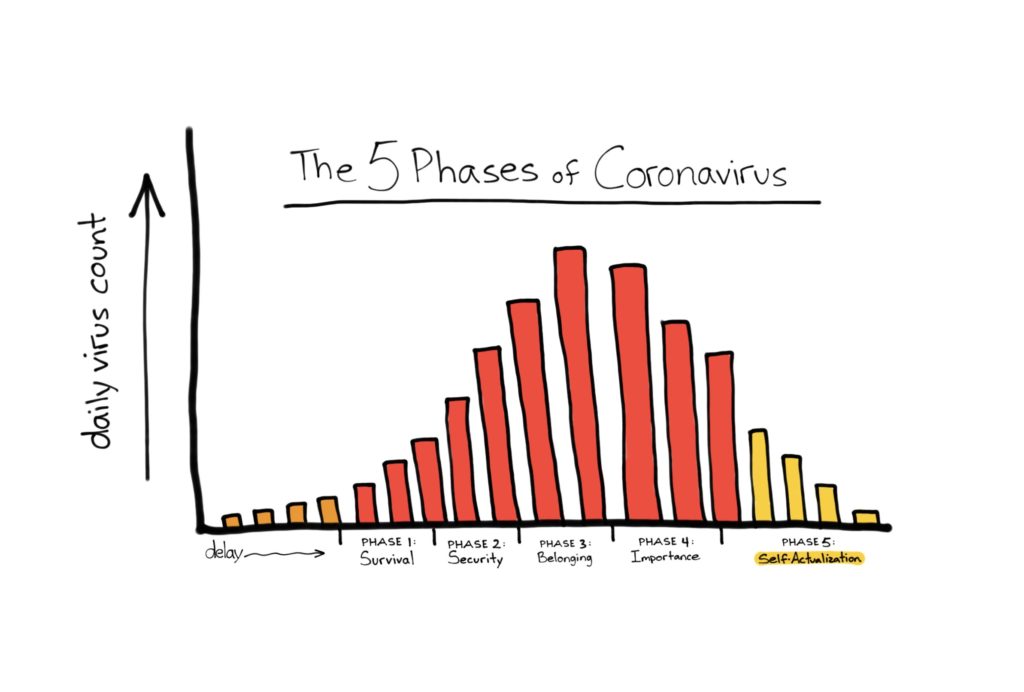
Let’s now turn our attention to studying, through Google Trends, how consumer behaviours are changing.
Doing your shopping
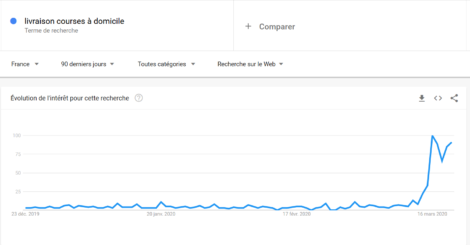 The first impact on the lives of consumers is, of course, on shopping. Going to the supermarket has become a source of anxiety. As a result, consumers in all countries are discovering on-line shopping (below) and home shopping deliveries (opposite). The volume of research on this last keyword has quadrupled.
The first impact on the lives of consumers is, of course, on shopping. Going to the supermarket has become a source of anxiety. As a result, consumers in all countries are discovering on-line shopping (below) and home shopping deliveries (opposite). The volume of research on this last keyword has quadrupled.
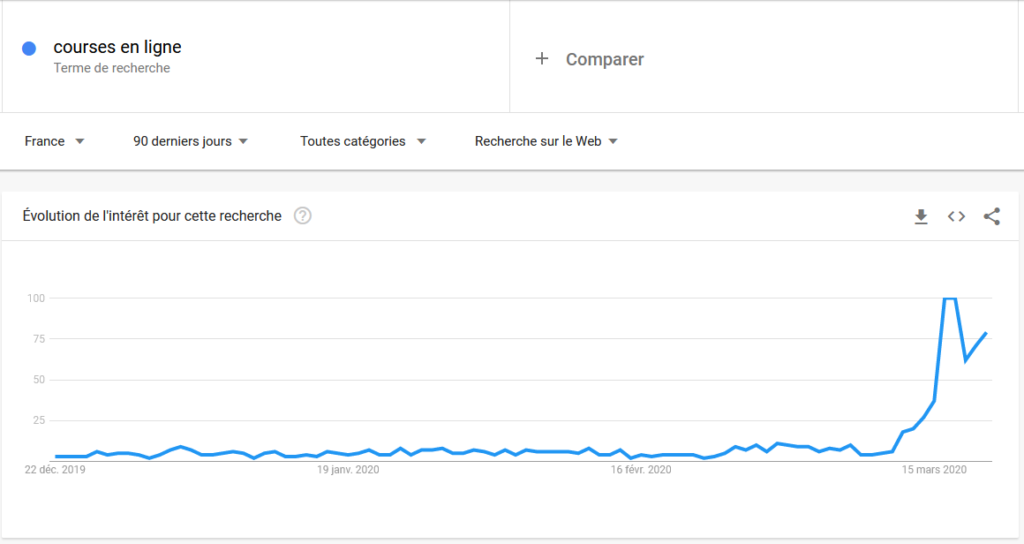
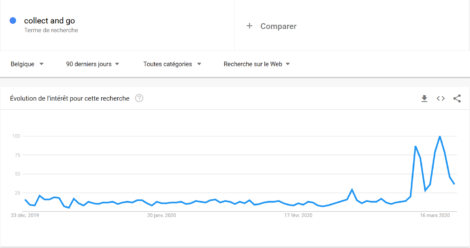 For supermarkets “drives”, too, the coronavirus crisis is a marketing godsend (not an operational godsend, since everyone is overwhelmed). Let’s cross a border and go to Belgium, where retailer n°1, Colruyt, is promoting its order preparation service under the brand name “Collect & Go“. As the country is bilingual, this generic term allows us to appreciate the interest in the nationwide request. The highest peak (17 March 2020) corresponds to the date on which the containment decision was communicated to the Belgian population.
For supermarkets “drives”, too, the coronavirus crisis is a marketing godsend (not an operational godsend, since everyone is overwhelmed). Let’s cross a border and go to Belgium, where retailer n°1, Colruyt, is promoting its order preparation service under the brand name “Collect & Go“. As the country is bilingual, this generic term allows us to appreciate the interest in the nationwide request. The highest peak (17 March 2020) corresponds to the date on which the containment decision was communicated to the Belgian population.
Eating
 Meal delivery does not seem to benefit as dramatically from the confinement in France. If there is an increase, the current search peak does not “overwrite” previous peaks as in the previous search curve.
Meal delivery does not seem to benefit as dramatically from the confinement in France. If there is an increase, the current search peak does not “overwrite” previous peaks as in the previous search curve.
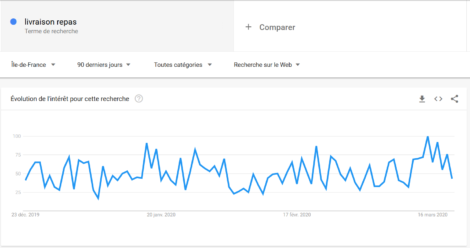 For the Paris region in particular, there is not much more interest in this research than there was before containment.
For the Paris region in particular, there is not much more interest in this research than there was before containment.
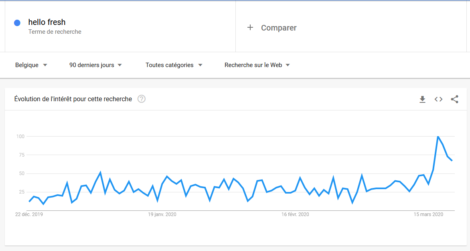 An interesting phenomenon can be observed in Belgium where the delivery of ingredients and recipes is offered by Hello Fresh. We can see that interest in this mode of consumption has doubled. Consumers are rediscovering the pleasure of cooking but lack ideas for recipes.
An interesting phenomenon can be observed in Belgium where the delivery of ingredients and recipes is offered by Hello Fresh. We can see that interest in this mode of consumption has doubled. Consumers are rediscovering the pleasure of cooking but lack ideas for recipes.
Having fun, keeping busy
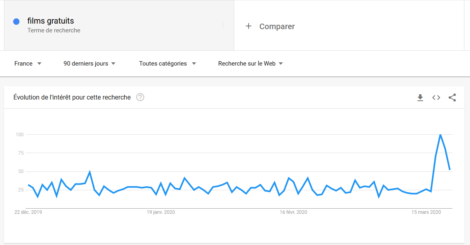 When you’re confined, the question of entertainment comes up quickly. So, the demand for “free movies” explodes…
When you’re confined, the question of entertainment comes up quickly. So, the demand for “free movies” explodes…
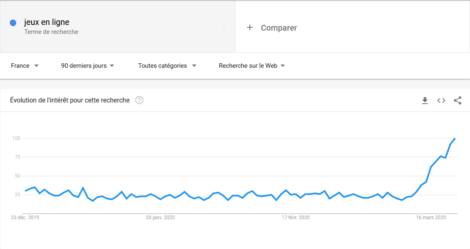 …as well as those concerning on-line games.
…as well as those concerning on-line games.
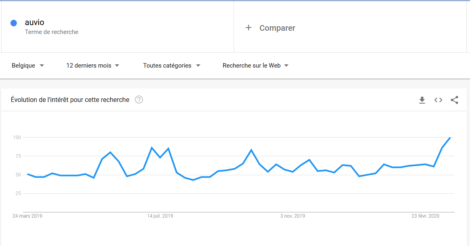 For streaming platforms, the interest is also keen. In Belgium, public television has a free streaming platform known as Auvio. You will notice that the search for this term has increased significantly and even surpasses the period of the football world cup in June-July 2019 (already a record period). Since access to Auvio is based on (free) registration, we can expect an explosion in the number of accounts created.
For streaming platforms, the interest is also keen. In Belgium, public television has a free streaming platform known as Auvio. You will notice that the search for this term has increased significantly and even surpasses the period of the football world cup in June-July 2019 (already a record period). Since access to Auvio is based on (free) registration, we can expect an explosion in the number of accounts created.
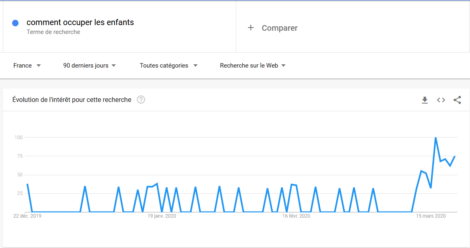 But with confinement also comes the question of the children that we were no longer used to having around for so long. The weekend is bearable but 7 days a week it becomes difficult. Hence the legitimate question: “how to keep the children occupied“.
But with confinement also comes the question of the children that we were no longer used to having around for so long. The weekend is bearable but 7 days a week it becomes difficult. Hence the legitimate question: “how to keep the children occupied“.
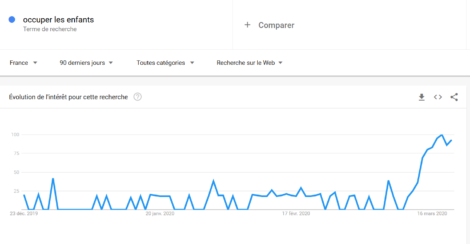 and its “keeping the kids occupied” variation. The increase is obvious, no doubt in proportion to the difficulties felt by the parents.
and its “keeping the kids occupied” variation. The increase is obvious, no doubt in proportion to the difficulties felt by the parents.
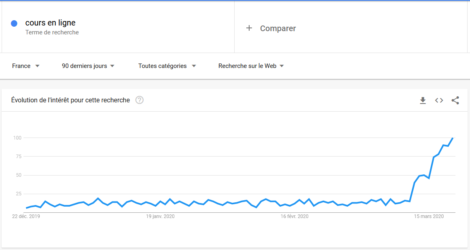 Keeping children occupied includes learning and revision. But when nothing is provided for by the authorities, it is the resourcefulness that reigns supreme, so you have to look for on-line courses for the little dears.
Keeping children occupied includes learning and revision. But when nothing is provided for by the authorities, it is the resourcefulness that reigns supreme, so you have to look for on-line courses for the little dears.
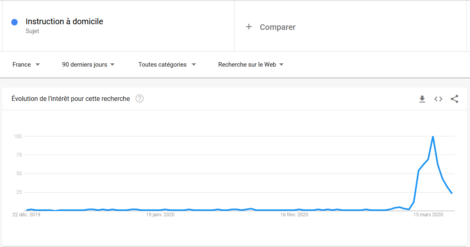 The interest in “on-line instruction” has logically increased almost infinitely, suddenly emerging from nothing. Indeed, who would have wanted to educate their child at home when the national education system does such a good job of it?
The interest in “on-line instruction” has logically increased almost infinitely, suddenly emerging from nothing. Indeed, who would have wanted to educate their child at home when the national education system does such a good job of it?
Working
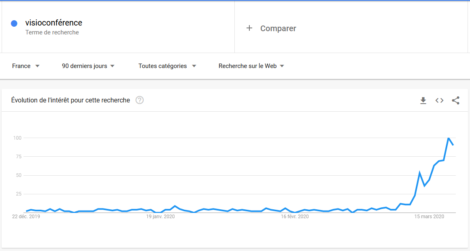 Finally, because containment also means working, the French are looking for solutions to continue to be “productive”. The demand for videoconferencing is exploding very logically.
Finally, because containment also means working, the French are looking for solutions to continue to be “productive”. The demand for videoconferencing is exploding very logically.
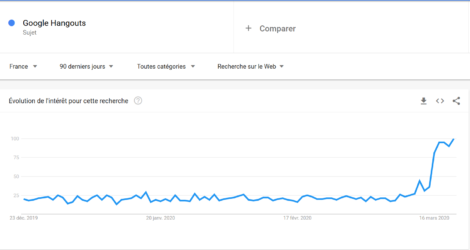 The French discover in particular the joys of Google Hangouts …
The French discover in particular the joys of Google Hangouts …
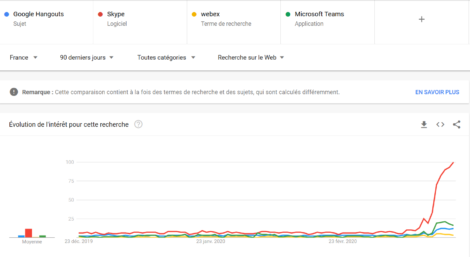 … but Skype (red curve) remains the most famous brand in front of Google Hangouts, WebEx and other Microsoft Teams.
… but Skype (red curve) remains the most famous brand in front of Google Hangouts, WebEx and other Microsoft Teams.
Playing sports
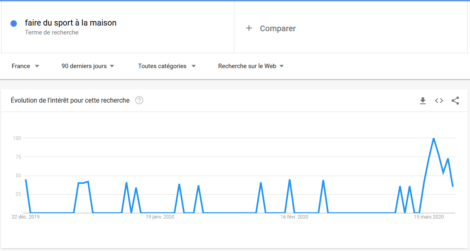 Let’s not forget to move around a bit. Sedentary lifestyles are not good for your health, it’s well known. If the French are indeed trying to find out how to do sports at home …
Let’s not forget to move around a bit. Sedentary lifestyles are not good for your health, it’s well known. If the French are indeed trying to find out how to do sports at home …
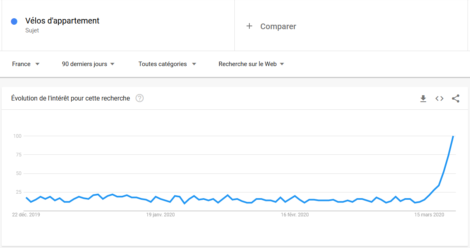 What interests them most is to get into action with an exercise bike …
What interests them most is to get into action with an exercise bike …
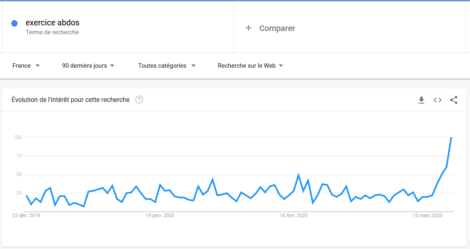 … and keep a flat stomach by doing some sit-ups. Google Trends search results are not gendered, so you’ll never know if that last inquiry is the query of one gender rather than the other.
… and keep a flat stomach by doing some sit-ups. Google Trends search results are not gendered, so you’ll never know if that last inquiry is the query of one gender rather than the other.
Everyday problems and other worries
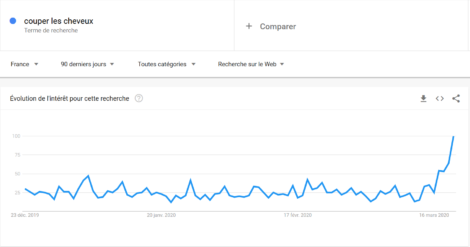 Containment leads consumers to ask metaphysical questions … Confronted with new adversity, they wonder how to cut their hair since the hairdressers are closed.
Containment leads consumers to ask metaphysical questions … Confronted with new adversity, they wonder how to cut their hair since the hairdressers are closed.
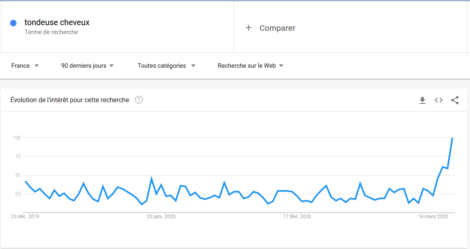 This leads them to take an interest in hair clippers, the ideal solution for all confined men. The end of the confinement is likely to bring out some stereotypical or botched haircuts.
This leads them to take an interest in hair clippers, the ideal solution for all confined men. The end of the confinement is likely to bring out some stereotypical or botched haircuts.
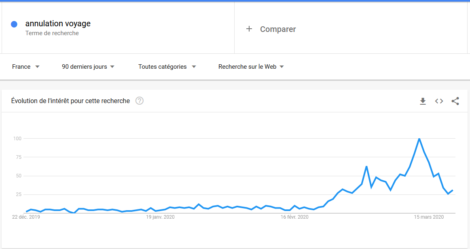 Coronavirus and confinement are also a great opportunity to stay at home and cancel trips abroad. The customers thus come to consult for the first time the conditions of the cancellation of their trips …
Coronavirus and confinement are also a great opportunity to stay at home and cancel trips abroad. The customers thus come to consult for the first time the conditions of the cancellation of their trips …
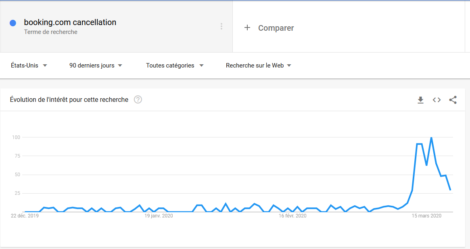 … and this also applies to our English friends who booked their holidays on booking.com. The spike that follows the announcement of confinement shows that this phenomenon is punctual and is due to a feeling of panic.
… and this also applies to our English friends who booked their holidays on booking.com. The spike that follows the announcement of confinement shows that this phenomenon is punctual and is due to a feeling of panic.
Image credits : shutterstock
Posted in Research.




